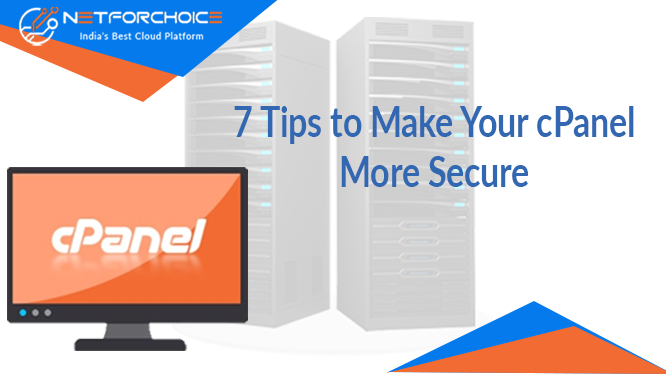How to Secure cPanel server from Cyber Attacks – Ultra Strong 7 Tips

You wouldn’t like someone snooping around your cPanel server, would you? Secure it right now.
cPanel is the most popular web-based website control panel used by millions of people around the globe. It handles your business-sensitive website.
Unfortunately, it’s also true that malicious hacks, data breaches, and password leaks are becoming more commonplace. To prevent your cPanel server ending up in someone else hands, you will need to secure your account.
Let’s take a look at how to secure cPanel server from hackers in just 7 easy steps.
Best 7 Ways to Protect cPanel Data
No matter what application you may be using, the security of that application is always a concern, especially if the application is used for storing crucial website data. In the subsequent section, we will go through the top 7 cPanel security features.
- Implementation of Strong Password
- Security with SSH
- Apache Security
- Access to Limited IP Address
- Disable Anonymous FTP
- Update cPanel
- Firewall Protection
Let’s get into the detail.
Set a Strong Password
No guide to security is complete without this basic but vital tip. Your cPanel is a critical account because you use it to manage your server and other services. If someone broke into your account, they could really mess with your website.
That’s why it is suggested to upgrade your password strength before you do anything else. Even if you already use a strong password, changing it at a regular interval of time is still a good idea. Make sure your password has a strong combination of lowercase, Uppercase, and special characters to avoid hacking of user-level accounts. Never use passwords that include dictionary words, your name, or significant dates.
We recommend using the Password Generator Tool in cPanel for a really good password suggestion. Remember to create a strong password that you don’t use with any other account.
Enhance Security With SSH
Secure Shell or SSH can be defined as a remote connectivity tool in Linux. It helps users to log into a remote machine and execute commands. That’s why SSH security is a must as it can become a pivotal point of attacks.
It is suggested to use a port number less than 1024 and the port which is not in use. On transport protocols such as TCP, UDP, and SCTP, ports 1-1023 are by default privileged ports. To bind to a privileged port, a process must be running with root permissions. On the other hand, ports greater than 1023 are by default non-privileged. These are the ports that regular users can bind. It is great to implement SSHv2 instead of SSHv1. As well as, modify the #Protocol 2,1 line in the /etc/ssh/sshd_config file to Protocol 2.
Above all, configure the shell resources limit for your users. It ensures limited access to your server’s resources. To do this, you can configure shell resources limits in the /etc/security/limits.conf file on most Linux systems.
Secure Apache
Another cPanel security solution is to secure your Apache installation. To do this, ModSecurity helps you. When you compile Apache, integrate the suEXEC module to make sure that CGI applications and scripts execute as the user that owns and executes them. This module helps to find out the location of malicious scripts and who executed them. Besides this, it includes permissions and environment controls.
In the nutshell, it is suggested that always compile Apache and PHP with the suPHP module. It is a tool for executing PHP scripts with the permissions of their owners or a program that controls who can access certain files. All scripts executed on the server need to be authorized to run on the server. It can only be done via File permissions.
Allow Limited IP Address
It is advised to allow only certain IP addresses to access the following services on the server. For this, you can use WHM’s Host Access Control interface.
- cPanel (cpaneld)
- WHM (whostmgrd)
- Webmail (webmaild)
- Web Disk (cpdavd)
- FTP (ftpd)
- SSH (sshd)
- SMTP (smtp)
- POP3 (pop3)
- IMAP (imap)
Also, use the /etc/hosts. allow file directly to configure this.
Turn OFF Anonymous FTP
It is the biggest threat to open Anonymous FTP. A hacker can take advantage of this. Just disable it and secure your cPanel. To do this, just set the “Allow Anonymous Logins” to ‘NO’.
Update cPanel
New vulnerabilities are discovered regularly. For this reason, it is important to regularly update your version of cPanel, as well as your browser, and your operating system. Keeping your panel updated will stop you from falling victim to viruses, spyware, rootkits, and Trojans that could also give hackers access to your cPanel account. The makers of cPanel make this easy by including the ‘Upgrade to Latest Version’ option on the cPanel homepage.
Implement Firewall Protection
Enable firewall to keep your information private from outsiders and avoid several kinds of attacks on your data. Always use Firewall Protection, Anti-Virus, and Anti-Rootkit in place.
Final Say!
Worried about the security of your cPanel server? It’s a valid concern. That’s why it is always wise to review your account security options. Read this post and learn how to secure cPanel server.
If you are looking for cPanel Hosting, then connect with NETFORCHOICE. We facilitate a seamless way to create a website and manage every aspect of your hosting account at affordable pricing.
To get help, just submit the Query Form with all your requirements & questions. We will connect with you in a minimum timeframe.
Submit Your Query

